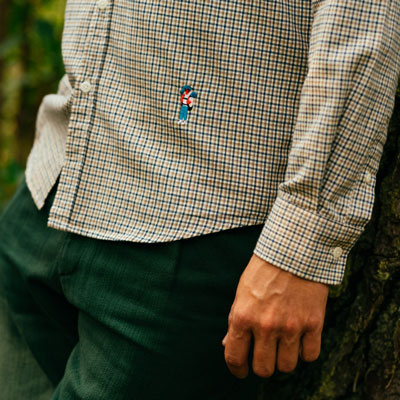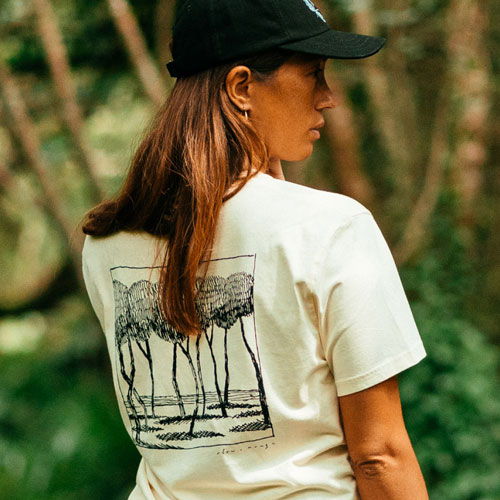Valley Maker: celestial encounter with a shamanic folk
In a time where ecology is at the heart of everyone’s concerns, nature has taken up a fairly considerable amount of space in the collective thought process. It has become such an object of fascination that even the slightest tree talker, who would have been deemed a total loser a few years ago, can now become a leading figure of a brand new religion. If his dogma recommends hugging a tree trunk to hear its sap flow, other more tenacious ones busy themselves in leading a nutritional revolution or in taking to the seas to martyrize blue fin tuna fishermen.

Even though, at first glance, a vegan’s motivations seem far different to the ones of an ecoterrorist, they are nevertheless rather quite similar in their intentions: to protect and preserve Mother Nature. Therefore, because it has always more or less been a reflection of today’s world, art, like a sponge, saturates the essence of this fight with ourselves, and, in a rather more subtle way, music seizes its poetic dimension. Remember the time when it beautifully inspired S. Carey with his “Range of Light”; from those scintillating contemplations flowed a powerful musical exaltation that strengthened the author’s passion for American naturalist John Muir. Or even Björk’s hallucinating synergy on “Biophilia”, one of the artist’s major pieces that translated a whole musical concept, complex and fascinating at the same time, around nature and its workings.
Valley Maker’s music goes in that same direction. Its musical environment instinctively pertains the Mother’s scent, of those pines she births, that fog she delicately blows over those landscapes she sparingly draws. You can’t explain that impression of immersion, that mental projection in these contemplative and preserved places Austin Crane’s music carries us into. Contacted via e-mail, the young American carefully answered my questions in order to unravel a few mysteries (well, nearly). Austin’s words virtuously left the album’s contemplative magic intact, made slightly more real but still as fascinating: “I find the landscape and weather of the Pacific Northwest to be really inspiring. I walk around the city and see mountain ranges, bodies of water, mossy trees, etc. I think it’s good personally and for my songwriting to have natural reminders that I am small and temporary. It’s good to be surrounded by beauty and always changing weather. For as idyllic as the summers are here, the winters are very grey and rainy, which can be difficult. It’s an artistic challenge to channel both extremes into creative productivity. Being stuck inside this winter led to a lot of writing and recording“.
What’s most striking is the way in which Valley Maker conducts both content and style. Because it’s pleasing to see many artists don’t only make music so that it may sound good, Austin Crane put the sensitive and spiritual aspects of his every day life into writing his first album, “When I Was a Child”: “In my reading/experience of the song, the phrase seems to reference the act of creation, or the presence of a creator, in relation to the intermittent beauty and futility of life; it harbors an awareness of the end, but wants to sit with questions, to exist in the present.” This personal elegy then overrides a more nostalgic way of treating his influences and past experiences, as his album title reveals: “Musically I would say that my biggest influences are songwriters that have a certain honesty, or rather an honest engagement with life’s mysteries in their writing and musical compositions. Maybe that sounds esoteric, but I don’t think that quality even needs to be intellectual; it’s something that’s felt just as much. For me, this honest quality often comes from a rootedness in certain places and experiences, but more importantly I think it’s about writing songs that create a space for the listener to inhabit with their own questions, doubts, and experiences. I grew up listening mostly to a kind of commercialized religious music that felt very propositional – as if it was created to teach you lessons and to reinforce what is already known. As I grew older, I began to listen to classic songwriters like Bob Dylan, Neil Young, and Townes Van Zandt, as well as more contemporary songwriters like Jason Molina, Joanna Newsom, Chan Marshall, Will Oldham, and Bill Callahan. Through these artists and others, I understood more and more the kind of songwriting that most appeals to me, and what I wanted to do musically“.
Over the course of the interview, Austin’s words take on another resonance. My music lover’s memories suddenly established a parallel between his and Sufjan Stevens’ musical approach, who both take music as a full on therapy, made up of beliefs and old demons; a therapy we could, in the long run, deem occult, but less hostile and inaccessible than it seems. All this was, of course, confirmed: “I think his latest album, “Carrie and Lowell”, is a masterful example of this kind of songwriting; its honesty is so disarming and his way of writing/composing created a space that I could inhabit with my own experiences of grief, loss, faith, doubt, etc. and attending questions. I vividly remember different experiences with that record: lying down on my couch and listening upon purchase, driving with my wife through Mount Rainier National Park and listening to the entire thing in silence/shared understanding, seeing it live with 2,000 other people in Seattle and being amazed at how intertwined the room felt“.
“Music is truly a mysterious entity – I’ve always loved how we associate music with places, experiences, or moments in life. I love how when you listen to a song months or years later it can bring you back to a moment in time and space, maybe one you shared with others or just an important moment you had with yourself. So I’m inspired by songwriting with that sort of transportive and mysterious quality – songs that make me feel like I’m not alone in my thoughts and experiences, songs that provide a space for contemplation, and that honestly engage processes, not merely conclusions.”
With that beautiful vision of the art of music, Valley Maker assures us he is definitely part of those projects so rare they become precious. Poorly valued and badly considered in the media storm, Internet is bursting with sumptuous treasures: “When I Was a Child” is an unadulterated gem. Made up of spiritual and melancholic movements, branded in the divine “Oh Lightning”, “Only Friend” and “Something Like Someone” (among other marvels), Austin Crane’s voice has that singular tone of a young shaman, one who frees clairvoyant truths on the world and who enters frightening but exalted trances. His songs create stupor, destabilise and awaken a bundle of incontrollable, delectable, and simply stunning emotions. Can we talk about transcendence? I think so.
—
Text and comments gathered by Julien Catala.
I’d like to warmly thank Austin Crane for his honesty, kindness and his genius.
His album “When I Was a Child” was released on 25th September 2015 on Brick Lane Records.
You can follow Valley Maker’s news over here: Facebook – Official website.





